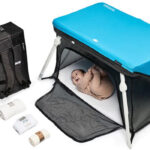By

14 Ways To Get Cheap Train Tickets
Trains aren’t always the cheapest form of transport – and prices only seem to be going up. However, depending on where you’re travelling to, sometimes you have no other option but to splash out on tickets.
But despite prices generally being way higher than they should be (sometimes even more expensive than flights!) there are loads of tricks you can pull to get a serious discount on rail travel.
Here’s how to get the best deals on train tickets.
1. Get a railcard
Seriously, you’ll kick yourself if you don’t get one of these. A railcard will save you so much money (potentially even from the very first time you use it), so it’s particularly handy if you’ve moved to the opposite end of the country for uni.
To get a rail discount as a student, buy the 16 – 25 railcard as it will take a third off every train ticket you buy and costs £30 a year. It may sound a tad on the pricey side, but if you spend £90+ on train travel a year you’ll already be making a saving.

If you don’t qualify for the 16 – 25 railcard, and usually travel with someone else, it might be worth buying a Two Together railcard instead. This will also get you both a third off all fares (as long as you’re travelling after 9.30am Mon – Fri) and costs £30.
You can also be super sneaky and make your railcard last until you’re 27 by buying a three-year card just before your 24th birthday (up to the day before your birthday, to be precise!). Once you hit 24, you’ll only qualify for a one year card, so think ahead and you could save yourself a mint.
Plus, you can currently get a four-year railcard for free when you open a Santander student account!
2. Get cheaper travel tickets in London
Technically this doesn’t just cover ‘trains’ as such – but a handy extra benefit of having a railcard is that if you live or travel in London, you can link it up to your Oyster card and get a third off your travel there too.
This covers all off-peak journeys that are pay as you go (as opposed to one made using a monthly travelcard, for example) and includes trips made on the London Underground, London Overground and DLR service.
3. Travel at off-peak times
To get cheaper train tickets, it’s definitely worth travelling off-peak whenever possible. You’ll find that train ticket prices rocket at weekends and during rush hours, which are usually before 9am and just after 5pm (but this will vary depending on your route).
These periods are known as peak times, and tickets to travel during these times are usually much more expensive than others. Not only that, but you’re also more likely to end up standing for the entire journey since trains are typically overcrowded at these points in the day.
Train booking sites will notify you of peak times when you book, so take care to avoid them to save money.
You’ll need to check whether you need an on- or off-peak ticket before buying as sometimes it will be determined by when you end your journey, while on other occasions it’ll be when you start.
If you absolutely have to travel at peak times, make sure you reserve a seat when you book your ticket. It’s usually free to do so and helps avoid the risk of having to stand for three hours.
4. Book your ticket in advance to save money
The best time to book your tickets is 10 – 12 weeks before you travel, but even booking as late as a week beforehand can still make a big difference.
Travelling across the UK can cost well over £200 if you buy a ticket on the day of travel, but buying that same ticket a week or two in advance can save you as much as 43% on your journey.

Some operators will even let you buy advance tickets as soon as 10 minutes before the departure time! Check out this summary of the latest purchase times for an advance ticket with each major company.
If you’re not quite sure exactly when you’d like to travel, but don’t want to miss out on a discount for buying early, check out the Price Prediction tool on Trainline’s app.
This nifty little feature predicts when the price of your ticket will increase, and by how much. Given that Trainline has been selling train tickets for yonks, we’re inclined to trust their judgement on this one!
5. Split up your train journey
If you have a long journey that passes through several major stations, it might be worth checking the price of booking each leg of the journey separately rather than buying a single ticket straight to your destination.
For example, if you’re travelling from London to Edinburgh and the train passes through Newcastle, it might actually work out cheaper to buy two singles (London to Newcastle and Newcastle to Edinburgh) than one direct ticket – even though you have no intention of switching trains or getting out of your seat.
Amazingly, it can sometimes work out cheaper even though it’s the same journey.
Doing a manual search for the best ways to split your journey would take an age, so luckily there’s a tool to do it all for you. Head to TrainSplit, where their advanced search filters let you choose everything from the maximum number of changes to any train operators you’d like to include (or exclude).
It’s probably best to take advantage of these filters if you don’t want to end up like this savvy saver, who reduced the cost of a trip from Newcastle to Oxford by £56 but increased the number of tickets quite significantly…
6. Return tickets aren’t always cheaper
Just as you can split up your journey along the way, you can also divide a return journey into two single tickets to see if it works out any cheaper.
In most cases, it will cost pretty much the same for two singles as it does for a return. But every now and again, the oddities of the British train ticket system mean that two single tickets will actually be cheaper than a return.
It’s just a matter of doing your research. Sites like Trainline actually show you a price comparison between two singles and a return, so you can see which works out the cheapest.
7. Wait for ticket sales
This isn’t always the most convenient option, particularly if you have an exact date in mind that you’d like to travel.
But, if you can hold off buying tickets until the flash sales start, some of them are worth waiting for. If you’re lucky, you might be able to find £5 train tickets during flash sales.
8. Check if Megatrain covers your route
Our beloved Megabus began offering budget train seats over a decade ago, but they’re often overlooked as an option since the routes they offer can be quite limited.
Megatrain sells off seats on the less popular routes/times at a discounted price, which is why you won’t have seen any bright blue and yellow Megatrains on the rails – Megatrain tickets will get you a seat on an East Midlands Trains service (the only route they operate on), not their own.
However, if you’re travelling on an East Midlands Trains route, this is definitely worth looking into as the tickets are generally far cheaper than booking through other services.
But it turns out that there’s a way to get Megatrain tickets for as little as £1…
9. Get the very cheapest tickets on Megatrain
This tip comes courtesy of deal expert, Bronni, who has used the trick to get tickets for as little as £1.
The process is simple: go on to the Megatrain website and enter the journey you’d like to make. Then click on the calendar and select a date as far in advance as possible, and see if there are any £1 tickets. If not, note down the current latest date you can book tickets for (let’s call this Day X).
You’ll then need to regularly check back and wait for tickets on the day after Day X to go on sale. If you’re the first person to book a ticket on the service, you might be able to get a £1 ticket.
10. Bring your own snacks and drinks
The food sold on trains is very overpriced, so save yourself a mint by bringing your own.
Grabbing a snack at a nearby supermarket will work out cheaper (although nowhere too close to the station, as the mark-ups can be high), but making sandwiches at home and popping them in a Tupperware box will save you even more cash.
11. Complain about unfair service on trains
As if it wasn’t bad enough that it costs a fortune to ride the train, they’re also notoriously unreliable when it comes to arriving on time. You’ve almost certainly got your own train travel horror story, but thankfully you can claim some money back.
Each rail network will have its own rules and regulations on complaints, largely depending on whether or not they’ve opted into the Delay Repay scheme. Some will give you a partial refund for delays as small as 15 minutes, whereas others won’t pay out until you’ve been held up for at least half an hour.
They may also have a sliding scale, whereby the size of your refund is determined by how significant the delay was. It’s possible to get a refund of up to 100% back – essentially meaning your train journey could be free.
12. Consider getting a season train ticket
If you’re making the same journey multiple times a week (maybe you live a little way away from the main campus, or you’ve got a job in the next town), it might be worth investing in a season ticket.
Season tickets provide a discount to frequent rail travellers, and the longer your season ticket is for, the more you save. You can get them for any period of time that you’d like, but the most common types are weekly, monthly and annually.
However, season tickets aren’t always the cheapest option. Unless you’re commuting every day, you should do some quick maths to work out whether or not you’d actually get a discount. Use this season ticket calculator and compare the average journey price to what you currently pay.
It’s also worth noting that you can’t use a railcard with a season ticket. It should still be cheaper for regular commuters to get a season ticket, but again, it’s worth doing the sums.
13. Use a cashback site to buy train tickets
Before heading straight to the website of the rail company to book your tickets, it’s worth knowing that you could actually earn cashback on the money you spend if you go via a cashback site first.
Registering with cashback services like Quidco or TopCashback can see you earning a fixed amount of cashback on your ticket, or there’s even the potential to essentially get free train tickets!
But – and this is a big but – the cashback is usually very small. So small that you should work out whether it’s cheaper to go through a cashback site and shop at one retailer, or just go straight to another retailer with lower prices.
14. Exploit the perks of first-class travel (even with a standard ticket)
Usually, we’d strongly advise against getting a first-class ticket, but every now and then it could be worth spending a little extra.
If there’s a sale on, first-class tickets can cost just a few pounds more than standard ones. Many networks throw in a ton of perks for first-class passengers, including a free buffet cart and free WiFi (which sometimes also has free streams of films and TV too!).
A first-class ticket that costs £5 more than a standard could end up saving you money, as the unlimited free food and drink means you don’t have to buy or make your own beforehand. And, as long as you don’t go way over the top, there’s nothing stopping you from taking home some of the free stuff for later.
But buying a first-class ticket isn’t the only way to get some perks. If you’re on a train that only has WiFi in first class (or if it’s only free there), there’s a very good chance that anyone sitting nearby can also get in on the action.
You usually can’t specify which seat you’d like to reserve if you book in advance, so to take advantage of this hack, you’ll either have to skip reserving a seat and risk standing, or simply hope that your reserved seat is right by the first-class section.
Alternatively, if you have reserved a seat but board the train to find that it’s fairly empty, there’s nothing to stop you from moving towards the first-class seats and setting up camp just outside.
Best train ticket companies to book with
You can find cheap train tickets on these booking sites:
Trainline

Pros: Great extra features on the app, e-tickets available
Cons: Booking charge, delivery charge, not always the cheapest prices
It may not always be the cheapest place to buy tickets, but the Trainline app is worth having just for the sheer selection of extra features.
As we mentioned earlier, the Price Prediction is particularly handy, helping you make sense of the wacky world of train ticket prices so that you can find the best deal.
RedSpottedHanky

Pros: No fees, e-tickets available
Cons: Delivery charges
RedSpottedHanky’s lack of fees makes it by far one of the best places to get cheap train tickets. They claim users save 61% on average – that’s impressive!
Keep in mind that if you want to get your tickets delivered, you have to pay a delivery charge. However, there is an e-ticket option or you can collect your tickets free of charge at the station.
Raileasy

Pros: Can easily switch between cheapest fare and most flexible, e-tickets available
Cons: Booking fee, basic site
From the good people who brought us TrainSplit, it’s… well, the good people themselves!
Raileasy’s site may not look as jazzy as some of the alternatives, but the functionality is all there.
That said, they do charge fees for booking, so you’ll want to make sure their prices are lower than the competition’s before shelling out.
Megatrain

Pros: Ridiculously cheap tickets
Cons: Booking fee, only available on one train network
But it’s worth reinforcing the fact that the prices on Megatrain are usually substantially cheaper than elsewhere, and you can sometimes get tickets for as little as £1.
It’s just a shame that Megatrain only sells tickets on one network (East Midlands), as we’d love these prices to be available across the country.
Oh, and Megatrain also has a £1 booking fee – but at these prices, it shouldn’t make a significant difference to the overall cost.










